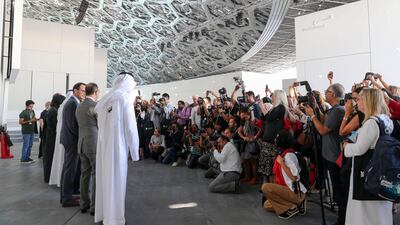Think of any major world city and the image of an iconic building will almost always spring to mind – one that traverses all languages and cultures and is instantly recognisable as embodying the values and culture of that place. Whether it is the dhow sail-shaped Burj Al Arab, the bold curves of the Sydney Opera House or the solemnity of Big Ben, they represent the fabric and essence of the city and country they are in, a confident signal to the world that they are extraordinary and significant. That they matter.
This week, we can add to that list Louvre Abu Dhabi, whose elegant domed roof, mirage-like moat and twinkling rainfall of light is already synonymous with the name of the UAE capital. But this ambitious project, more than 10 years in the making, is about more than just bricks and mortar – or in the case of Louvre Abu Dhabi, 7,850 giant jigsaw pieces of aluminium painstakingly pieced together. Nor does it simply say Abu Dhabi has arrived as a serious cultural contender. All those things are true, of course, but integral to its creation is a more profound message of making connections between civilisations and weaving tales about our commonalities through time rather than emphasising our differences. It is, in essence, the story of humanity spanning centuries.
Walk through its 23 galleries and you will see exhibits arranged, not by cultures or countries but by themes, spinning subtle links between art, design, fashion, literature and philosophy stretching over millennia and crossing borders. A Bactrian princess takes pride of place alongside a statue of Ramses II and Sumerian sculptures. An homage to Asian trade routes contains riches such as a 1,500-year-old Chinese Buddha, a 13th-century silver vessel and a 15th-century Anatolian carpet. Empires from across Europe, Asia and Africa are featured in a room dedicated to the magnificence of the court. It is a world first in terms of making those links between civilisations miles and centuries apart and points to the fact that as humans, we have always been travellers at heart, hungry to discover other cultures and absorb knowledge and ideas. Those ancient silk routes from East to West and vice versa were not simply about trading in silk and spices; they were about the exchange of ideas, of philosophies and the sharing of religious and cultural ideals.
There will, of course, be naysayers. There will be those who claim Abu Dhabi is simply importing culture by opening the outpost of a French institution. But let's not forget that original museum was opened at the end of the 18th century, as the Age of Enlightenment was reaching its pinnacle and intellectual and philosophical debate was celebrated. In this new stop-off on the Silk Road, the Louvre Abu Dhabi is a salon whose doors are open to all. Let the conversations flow forth.

